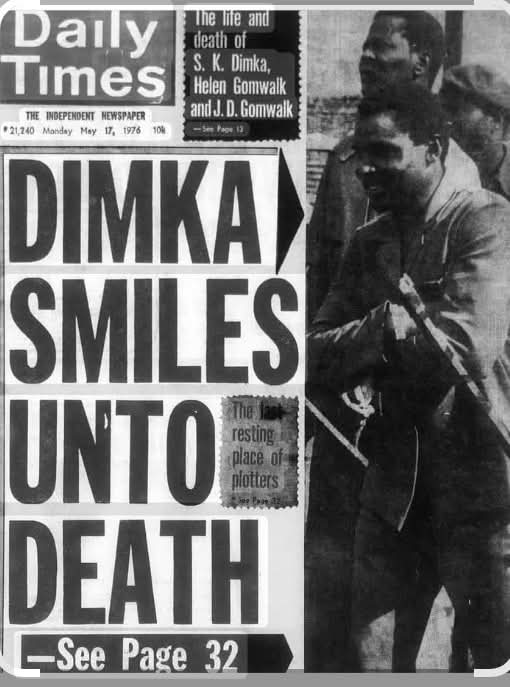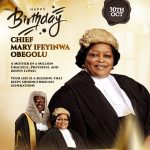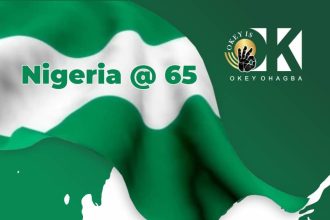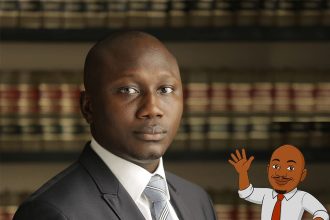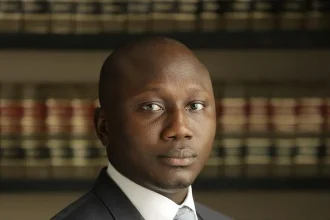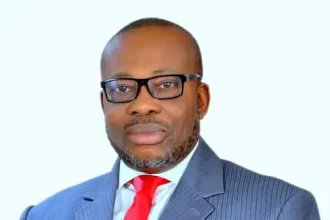On February 13, 1976, Nigeria was shaken by a violent coup attempt led by Lt. Colonel Bukar Suka Dimka, a senior officer in the Nigerian Army.
The coup, though short-lived, resulted in the tragic assassination of the Head of State, General Murtala Ramat Muhammed, marking one of the darkest moments in Nigeria’s post-independence political history.
The Coup Attempt
At about 8:00 a.m. on the morning of February 13, 1976, Lt. Colonel Dimka and a group of armed soldiers seized control of the Federal Radio Corporation of Nigeria (FRCN) in Lagos.

Through a live broadcast, Dimka announced the overthrow of General Murtala Muhammed’s government, accusing it of corruption, nepotism, and maladministration.
He declared that a new military regime was taking over to “correct the ills” of the nation.
However, unlike previous coups, this one was poorly coordinated and lacked wide military support.
While Dimka’s forces controlled the radio station and parts of Lagos briefly, loyal troops under Lieutenant General Olusegun Obasanjo and Brigadier Theophilus Danjuma, then Chief of Staff, rallied quickly to suppress the rebellion.
The Assassination of General Murtala Muhammed

The coup began tragically with the assassination of General Murtala Muhammed. While on his way to work at Dodan Barracks, Lagos, Murtala’s black Mercedes-Benz was ambushed at a traffic junction near Ikoyi by Dimka’s men.
The Head of State was shot and killed instantly, along with his aide-de-camp, Lieutenant Akintunde Akinsehinwa, and his driver.
The ambush sent shockwaves across the country, as Murtala had been one of Nigeria’s most charismatic and reform-driven leaders.
Simultaneously, the Military Governor of Kwara State, Colonel Ibrahim Taiwo, was also assassinated in Ilorin on the same day, further underscoring the calculated nature of the plot.
The Collapse of the Coup
By midday, loyal forces had regained control of key installations, and the coup collapsed within hours. Dimka fled Lagos and attempted to seek refuge in Jos, in present-day Plateau State.
The Nigerian Army quickly mounted a massive manhunt across the country.
After several days in hiding, Lt. Colonel Dimka was captured on March 6, 1976, in a friend’s house in Abakaliki, present-day Ebonyi State. He was arrested by soldiers acting on intelligence reports.
The Trial and Convictions
Following the coup’s failure, the Supreme Military Council (SMC), under the new Head of State, General Olusegun Obasanjo, established a Special Military Tribunal to try those involved in the conspiracy.
The tribunal was chaired by Major General Timothy Ogbemudia and comprised other senior officers.
Dozens of military officers and civilians were charged with treason and conspiracy to overthrow the government.
Among them was Mr. Joseph Gomwalk, the then Military Governor of Benue-Plateau State, accused of aiding and abetting Dimka’s plot.
After weeks of testimony and investigation, the tribunal found Dimka and Gomwalk guilty of their roles in the abortive coup. They were sentenced to death by firing squad.
The Executions
On May 15, 1976, Lt. Colonel Bukar Suka Dimka and Mr. Joseph Gomwalk were executed by firing squad at the Kirikirì Maximum Security Prison in Lagos.
Several other officers implicated in the coup were also executed at military barracks across the country.
The executions marked the conclusion of one of Nigeria’s most dramatic and painful coup episodes. The government justified the executions as a necessary deterrent to further insurrections within the military.
The Aftermath and Legacy
The failure of Dimka’s coup had profound implications for Nigeria’s political trajectory.
General Olusegun Obasanjo assumed power and continued the transition program initiated by Murtala Muhammed, which eventually led to the handover of power to a civilian government in 1979.
The event also strengthened military discipline and led to purges within the Nigerian Armed Forces.
Murtala Muhammed, remembered as a bold reformer, became a national hero and martyr. Abuja’s international airport and several institutions were later named in his honor.
Though nearly five decades have passed, the Dimka coup attempt of 1976 remains a significant chapter in Nigeria’s history, a story of ambition, betrayal, and the heavy price of political instability.



